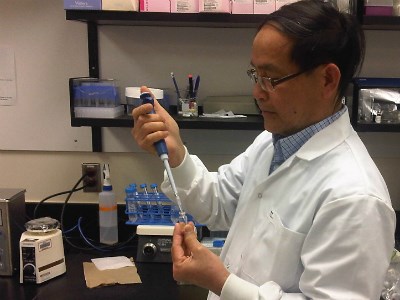An international research project being pioneered in Sudbury to help people quit smoking is one of this year’s winners of a major health research grant.
Led by Dr. Hoang-Thanh Le, a team at the Advanced Medical Research Institute of Canada(AMRIC), is experimenting with a novel way to help people kick the nicotine habit: an intranasal vaccine.
AMRIC is working in conjunction with the Institut Pasteur in Ho Chi Minh City, Vietnam.
The nicotine nasal vaccine project at AMRIC is one of 43 research projects in Canada to receive a grant of $100,000 from Grand Challenges Canada, which is funded by the Government of Canada.
The purpose of Grand Challenges Canada is to pursue innovative new ideas to tackle global health problems. Winners of the grants were announced this week.
“Canada's commitment to bold ideas with big impact is captured in each of these more than 100 peer-reviewed projects,” said Dr. Peter A. Singer, CEO of Grand Challenges Canada, in a news release.
“By matching talent with opportunity, Grand Challenges Canada is contributing to saving and improving lives.”
Based at Health Sciences North/Horizon Santé-Nord, AMRIC researchers have been working with a nicotine-derived compound administered intranasally (through the nose) which prevents inhaled nicotine from reaching the brain through the blood stream, thereby robbing nicotine of its potent and addictive effect.
“The vaccine we’re developing will convert nicotine into a compound that will trigger the body’s immune system,” said Dr. Le.
“Once triggered by the vaccine, the body’s immune system will create antibodies that will then block the nicotine from reaching the portion of the brain that makes smoking pleasurable. If we can take the pleasure and buzz out of nicotine, we can help a greater number of people kick the tobacco habit.”
Laboratory tests will be conducted early next year in Vietnam.
Researchers are anticipating a 90-per-cent-or-greater reduction of blood stream nicotine reaching the brains of test animals.
According to the World Health Organizations, cigarette smoking is the primary cause of lung cancer, cardiovascular disease and reproductive disorders, as well as 6 million premature deaths annually.
Treating tobacco and cigarette-related illness and disease places a huge burden on the global health-care system. Young people in developing countries constitute a disproportionate percentage of the world’s more than 1 billion smokers.
If the nasal nicotine vaccine proves successful, researchers anticipate the method could be used to treat other addictions and illnesses. If their ideas prove effective, the innovators will be eligible for additional Grand Challenges Canada scale-up funding of up to $1 million.
“I want to congratulate Dr. Le and the research team at AMRIC for being included in this elite group of research projects,” said Dr. Francisco Diaz-Mitoma, CEO of AMRIC and vice-president of research at Health Sciences North/Horizon Santé-Nord.
“The awarding of this grant demonstrates that world-class, life-changing research is being conducted here in Sudbury, with incredible implications and positive benefits for the health of people in northeastern Ontario and around the world.
"This is why research matters, and this is why AMRIC and HSN are committed to finding solutions to some of our most pressing health care challenges.”
Join Sudbury.com+
- Messages
- Post a Listing
- Your Listings
- Your Profile
- Your Subscriptions
- Your Likes
- Your Business
- Support Local News
- Payment History
Sudbury.com+ members
Already a +member?
Not a +member?
Sign up for a Sudbury.com+ account for instant access to upcoming contests, local offers, auctions and so much more.
